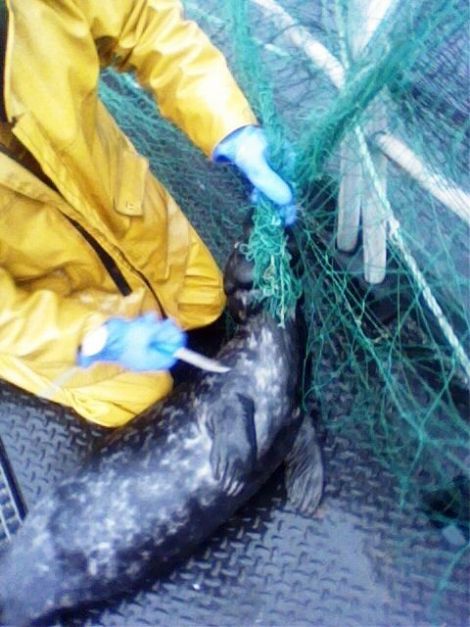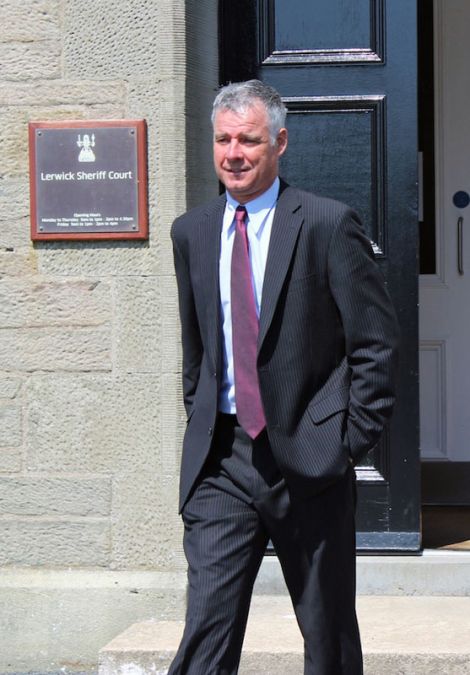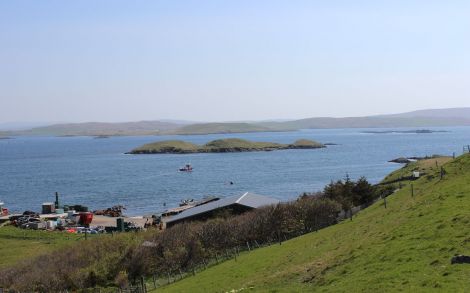News / Court challenged over dead seal evidence
A WILDLIFE campaign group has challenged the Crown Office over evidence withheld from court that seals had been killed in illegal nets at a Shetland salmon farm.
On Tuesday Meridian Salmon’s former Shetland regional manager Graham McNally admitted setting non-selective nets for the purpose of trapping and killing seals between March and August 2011.
The 52 year old was fined £800 after the court was told that no seals or other wildlife had been killed in the nets, that were set at the Hoganess salmon farm’s Cloudin site in Vaila Sound, off Shetland’s west side.
However shortly after the hearing, the animal welfare charity Scottish SPCA released photographs of a dead seal trapped in a net, which they said had been submitted to the Crown Office and Procurator Fiscal Service (COPFS) as part of their investigation.
The SSPCA later removed the photographs from their website, but the charity’s press office said the pictures were released because they had been presented to the Crown Office as evidence in the case.
In a statement the Crown Office said all available material had been considered and there was insufficient evidence “in law” to prove that seals had been caught in the nets.
A COPFS spokesman said: “The accused pled guilty to illegally using two nets around salmon cages between 16 March 2011 and 1 August 2011.
Become a member of Shetland News
“As was explained to the court, there was no evidence to indicate any seals had been caught in the nets during this period.”
However John Robins, of the Save Our Seals Fund, said that McNally originally pled not guilty to setting illegal nets between August 2009 and August 2011, based on evidence that seals had been entangled and drowned in such nets.
Robins has written to the COPFS asking if the charges were amended in return for a guilty plea or for any other reason, asking why the reference to the killing of seals was removed from the charges.
“Unless I have tangled up my court cases I was expecting hard evidence of dead seals to be presented by the prosecution,” Robins said.
“I hope there was a very, very good reason why this evidence was dropped.”
The wildlife campaigner has also written to environment secretary Richard Lochhead using this case to repeat his call for proprietary anti-predator nets to be made compulsory at all Scottish salmon farms.
Meanwhile Scottish SPCA chief superintendent Mike Flynn welcomed the outcome of the case, which he said was the first ever conviction for wildlife crimes under the 1994 European habitats directive.
Flynn said he could not explain why the pictures of dead seals had not been submitted to the court, nor why they were subsequently published on their website.
He added: “What is very important here is the sheriff laid down the sentence to act as a deterrent, because if no one has been prosecuted for something a lot of people think they will never get caught.
“A court has now…put down a clear message to say this type of net is illegal.
“Common seal numbers are decreasing and the illegal trapping and killing of seals is contributing to their decline.
“This case highlights that we will work tirelessly to pursue anyone involved in wildlife crime.
“We urge members of the public to contact our animal helpline on 03000 999 999 if they have any concerns in relation to the illegal killing of seals in and around Scottish waters.
“All information is treated in strict confidence and can be provided anonymously.”
Become a member of Shetland News
Shetland News is asking its many readers to consider paying for membership to get additional features and services: -
- Remove non-local ads;
- Bookmark posts to read later;
- Exclusive curated weekly newsletter;
- Hide membership messages;
- Comments open for discussion.
If you appreciate what we do and feel strongly about impartial local journalism, then please become a member of Shetland News by either making a single payment, or setting up a monthly, quarterly or yearly subscription.































































